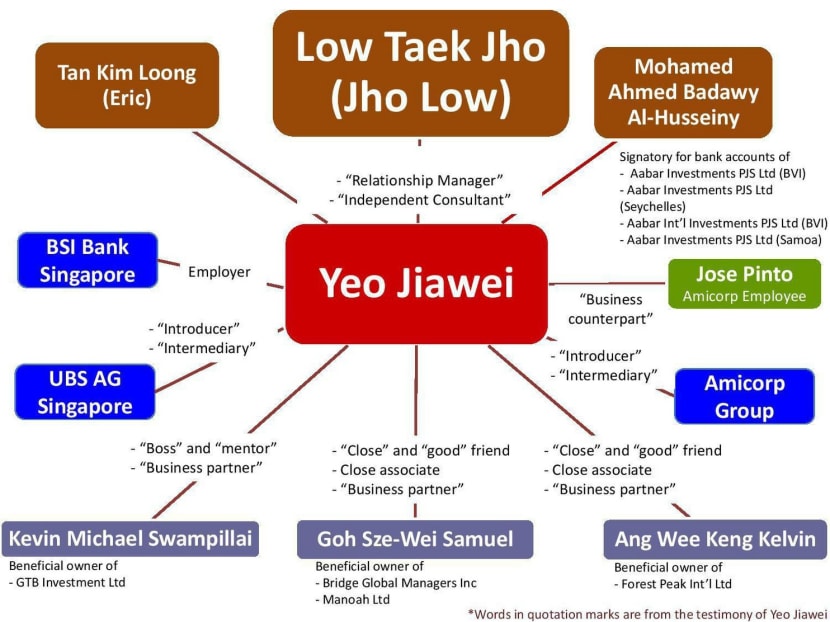Ex-banker Yeo made S$23.9m in just 15 months after leaving BSI: Prosecutors
SINGAPORE — When he left his job as a wealth planner at BSI Bank in June 2014, Yeo Jiawei had about S$2 million. But in the 15 months after he had left the Swiss private bank to become an independent consultant, serving clients including Malaysian tycoon Jho Low, Yeo’s income soared to S$23.9 million and he owned three properties in Singapore and two in Australia.

A court exhibit showing Yeo Jiawei’s relationship with various parties mentioned during his trial for tampering with witnesses involved in investigations into an international money-laundering operation. Photo: AGC
SINGAPORE — When he left his job as a wealth planner at BSI Bank in June 2014, Yeo Jiawei had about S$2 million. But in the 15 months after he had left the Swiss private bank to become an independent consultant, serving clients including Malaysian tycoon Jho Low, Yeo’s income soared to S$23.9 million and he owned three properties in Singapore and two in Australia.
It was “quite unbelievable” that Yeo could amass so much in that period merely acting as “an introducer, intermediary, independent consultant or relationship manager”, said Deputy Public Prosecutor Tan Kiat Pheng yesterday, as he wrapped up the case against the 34-year-old after 12 days of trial.
These monies, the prosecutor charged, were earned through illicit means, including taking secret profits from deals that Yeo was involved in with various persons of interest in Singapore’s investigations into an international money-laundering operation linked to 1Malaysia Development Berhad (1MDB).
In the current case, Yeo is accused of perverting the course of justice by interfering with witnesses central to these investigations.
The prosecution’s case is that to prevent the white-collar police from learning the truth of his illicit wealth and dealings, Yeo cooked up lies that he made two witnesses — his former BSI supervisor Kevin Michael Swampillai and business partner Samuel Goh — sell to the authorities.
Noting that Yeo’s explanations and excuses in court cannot hold water under scrutiny because they are “basically lies”, DPP Tan added that Yeo’s defence has been nothing more than “a bare denial of charges”.
Yeo stuck to his guns yesterday, arguing that the prosecution’s witnesses — such as Mr Swampillai, Mr Goh and Mr Jose Pinto, a relationship manager from Amicorp Group — have been lying “to save their own skin”.
In his testimony against Yeo, Mr Swampillai had incriminated himself when he admitted that the both of them pocketed commissions on the sly for transactions involving BSI when they were working there.
And Yeo said yesterday: “Seven months after I’m charged, (Mr Swampillai is) still not charged. Same for Mr Samuel Goh.”
During the trial, Yeo maintained that he was not behind the idea to communicate with Mr Swampillai and Mr Goh using a secondary phone to throw the authorities off their trail.
He also disputed their testimony that he had called for meetings to tally bogus explanations for allegedly illicit deals.
Yeo also disputed the assertion that his earnings after leaving BSI Bank had come from shady transactions. Rather, these were referral fees due to him as an intermediary to “one of the biggest” sovereign wealth funds, he said.
Asked by his lawyer Philip Fong about his accumulated wealth, Yeo noted that with investments worth billions of dollars, it was “very possible” that he could earn “quite a substantial amount of fees”.
Such businesses are also not constant every year, with Yeo adding that while he could be making this amount of money in one year, he might not get this kind of business or revenue on others.
The verdict for Yeo’s case is expected to be delivered on Dec 21.
Separately, Yeo faces seven other charges of cheating, forgery and money laundering, which will be dealt with in April next year.
Others who have also been linked to the investigations into the high-profile money laundering case here include Kelvin Ang, who was charged with corruptly giving a gratification sum of S$3,000 to a research analyst.
This was allegedly to expedite the preparation of a favourable valuation report to be issued by his equity research firm. Ang’s case has been fixed for a pre-trial conference on Dec 22.









